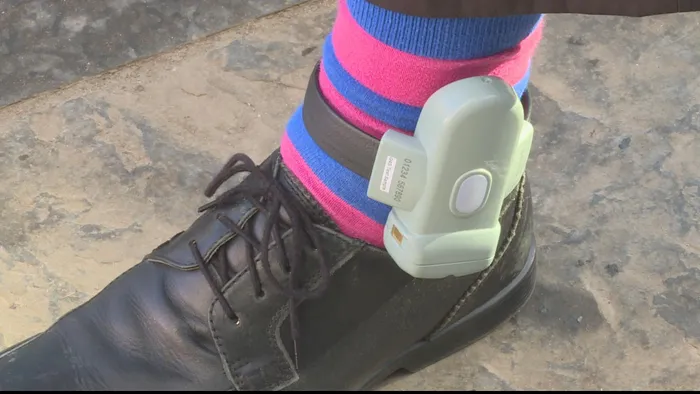Correctional Services delays electronic tagging plans for parolees amid legal disputes

The electronic tracking tag will be prisoners' ticket to freedom through parole if the Correctional Services reintroduces it.
Image: BBC
The Correctional Services authorities have called for calm among prisoners excited that they will soon have their legs electronically tagged and released on parole, as the reintroduction of the devices will not happen any time soon.
The SA Prisoners Organisation for Human Rights (SAPOHR) had issued a statement early this week saying that offenders who qualify for parole and awaiting trial detainees on bail were excited that electronic tagging, also known as ankle monitors, would soon be brought back as their ticket to freedom.
However, the Correctional Services national spokesperson, Singabakho Nxumalo, said the devices would not be reintroduced soon, as the department is still in court with a company that previously provided them.
The electronic leg bracelets were first introduced as a pilot project through a contract awarded to Engineered Systems Solutions (ESS) to the tune of more than R6.5 million in 2011.
The initial targets of the electronic monitors were hardened criminals, who were sentenced to death before 1994, but the sentences were reduced to life, and later became eligible for parole.
This was later extended to other parolees and on-bail awaiting trial detainees, who were deemed to be high-risk.
After the pilot project had been completed, Correctional Services awarded the main contract, which had a value of more than R300,000,000, to the same company in 2014.
However, in 2017, the department cancelled the contract, citing that it was too expensive with no value for money. This led to the ESS taking the matter to court, which Nxumalo said was yet to be finalised.
After finding some offenders, including a convicted rapist, breaching their parole condition by being in a tavern instead of confining themselves to their homes, Correctional Services National Commissioner Makgothi Thobakgale told the media last month that the department is in the process of bringing back the electronic bracelets.
However, when asked when devices were going to be brought back into the system, Nxumalo said this would take some time as the department was yet to resolve its legal dispute with the previous service provider.
“We need to resolve that court matter and have an electronic tap with another service provider that we will be able to work with.
“There is no start date,” he said.
Nxumalo stated that when the department is ready, it would put up a tender for companies to bid.
He said that after the matter was discussed in Parliament, there was an overexcitement by the people who thought this was going to be reintroduced soon.
“We are working on it, but this does not mean that we have a date for when this is going to happen.
“The discussion is ongoing, but we have not resolved on the direction we are going to take,” Nxumalo said.
He said the previous contract was cancelled after the department realised that it was too costly and that only a few devices were delivered.
“I think there were 1,000 devices, but when you look at the cost, there was no value for money. As a department, we said we need to terminate this contract because it had no value for money. Thereafter, the company took the matter to court, and currently the matter is still in court.”
He said monitoring the parolees and awaiting trial offenders through the device had the advantage for the department as it would save time and resources, which are currently used to visit each offender released on strict conditions.
“Let us say, in KwaMashu, for example, we have 20 parolees. Instead of deploying an official with a car to go and monitor those 20 people, putting tags on their legs would enable us to monitor their movements and see if they are in an area where they should be.
“You could see that instead of being in KwaMashu, he is in Ntuzuma or he is going to Umlazi, where he should not be, then we assign a car to go and attend to him. We can monitor more people without using many resources in terms of manpower,” said Nxumalo.
He said there were currently 65,000 people who are on parole and correctional supervision.
Countries that use electronic tags to reduce prison population include the United States, England, France, Scotland, and Senegal.
“If you are given bail, we have to monitor you, and instead of being kept in jail where we have to spend lots of money feeding you, we could put a tag on you and release you to go home and monitor you through the tag,” said Nxumalo.
Internationally acclaimed blade runner, Oscar Pistorius, who murdered his girlfriend Reeva Steenkamp in 2013, was once electronically tagged.
In a statement, SAPOHR leader Golden Miles Bhudu said there was excitement among qualifying parolees who were still in jail due to the department’s lack of resources to monitor them outside.
He said this was despite the fact that the devices would limit their right to privacy as they would be under the watchful eye of electronic monitoring.
“The majority of those whom SAPOHR interrogated about the resuscitation of the electronic tag versus privacy and human rights expressed an overwhelming, ‘TO HELL’, with privacy and human rights because there are, in any event, no privacy and human rights inside (prison),” read the statement.
bongani.hans@inl.co.za
Related Topics: